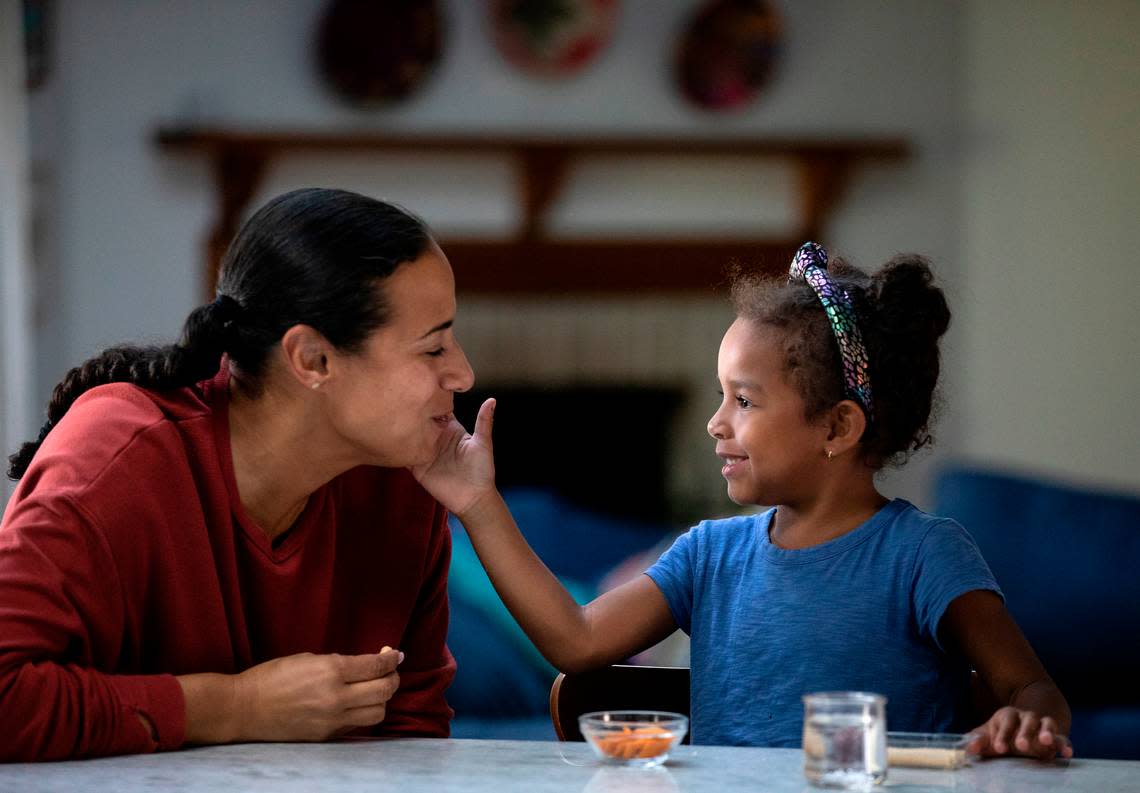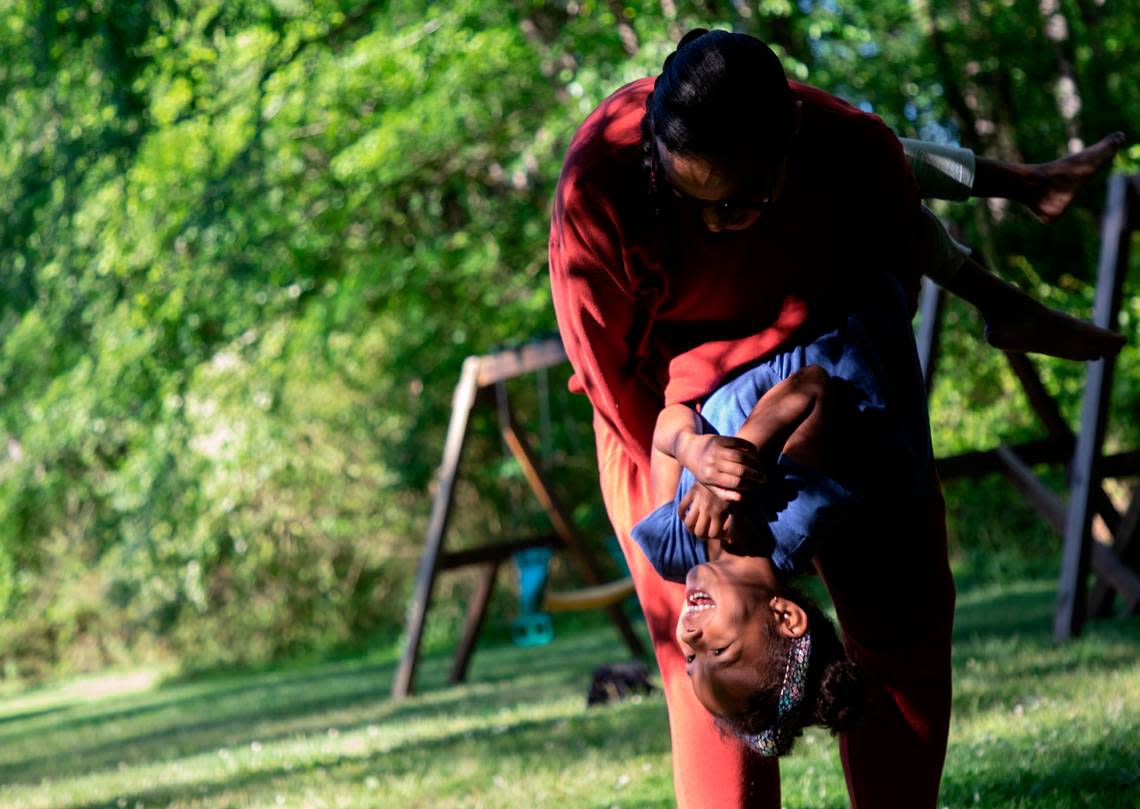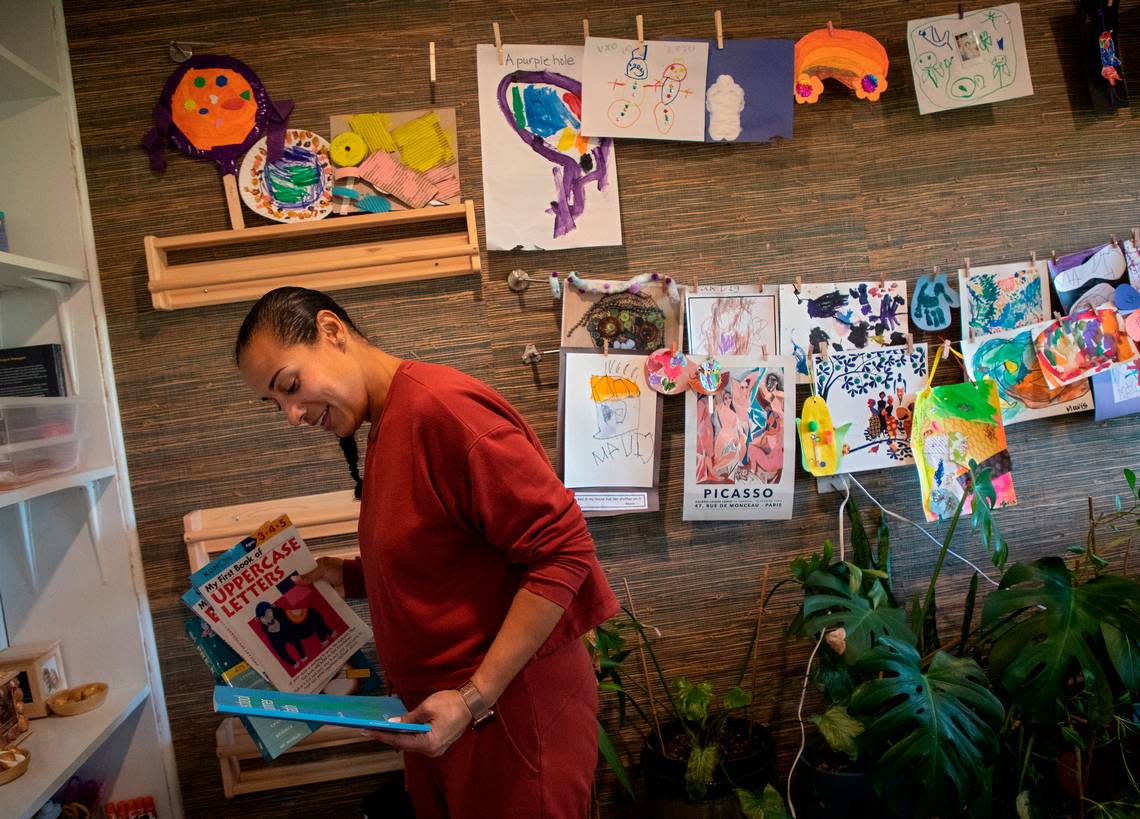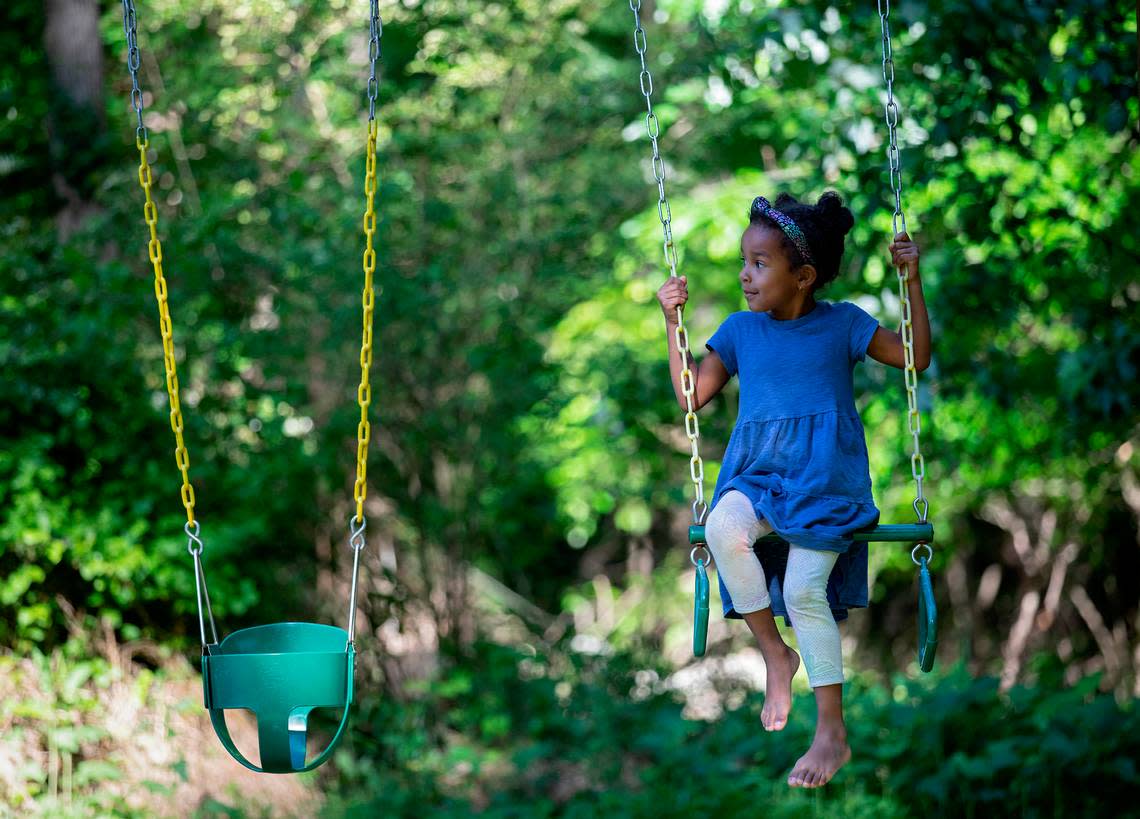When parents refused to send kids back to school amid COVID, this Triangle school sued
Like millions of children across the state, Kat Tedford’s daughter was forced out of her classroom as the spread of novel coronavirus became a deadly global pandemic in March 2020.
By the fall, parents like her faced a hard choice: whether to let their kids attend reopened schools or child care centers with no vaccines available to protect them.
But after Tedford and a handful of other families refused to send their children back to the Montessori School of Durham for the new academic year, leaders there did something that, by all accounts, is unusual among North Carolina private schools.
They sued the parents.
It’s yet another example of the pandemic’s unexpected knock-on effects that have lingered long after the rollout of vaccines, the sunset of mask mandates and the deaths of more than 25,000 North Carolina residents.
In six separate lawsuits filed as pandemic waves roared in early 2021, MSD sought to recoup tens of thousands of dollars in tuition for classes students never attended, costs stipulated in contracts signed weeks before the first COVID-19 case was ever detected in North Carolina.
The lawsuits have so far resulted in judgments of more than $130,000 for the school, which has an annual operating budget of more than $2 million.
And while those lawsuits wound their way through North Carolina courts, the Montessori School of Durham collected more than half a million dollars in federal coronavirus relief money. That aid helped boost its assets by the largest amount in years, according to tax filings.

Head of School Tammy Squires declined an interview for this story, citing pending litigation. She noted in a statement, however, that the school offered a COVID relief program and that the families they sued chose not to participate.
In court filings, Squires said tuition payments are essential to the nonprofit school’s operations.
Tedford, who is appealing a March order to pay MSD more than $37,000, said she feels betrayed. And she’s not alone.
“We had to do all of these things just to survive. And for them, they came out on top of this,” Tedford said. “They profited from the pandemic.”
‘We are a school’
Almost as soon as the Montessori School of Durham followed state orders to close its doors to the 150-odd toddler to elementary-aged children enrolled there, parents like Dikla Fuchs had concerns.
Chief among them: the school’s plans for remote learning for students as young as 1.
“If kids are not going to school, it forces me to pay someone else to look after them. Are you going to provide any credit for this period?” Fuchs wrote to Squires on March 13, 2020, less than an hour after an announcement that the school was going virtual.
Squires wrote back that school leaders “have not gotten to that discussion yet,” although they were working as fast as they could.
“We are a school, and we are providing remote learning to our students that will begin after the Parent/Teacher conferences,” Squires wrote. “Once we get the remote learning (up) and running and have a better understanding of how long this will last, we will begin to address parents’ questions.”
In the weeks that followed, parents like Fuchs and Tedford in the MSD toddler and early childhood programs started receiving the school’s remote learning materials. The email newsletters reviewed by The News & Observer included ideas for activities like making tree bark rubbings, creating homemade playdough or threading pipe cleaners through a colander – sometimes linked to online blog posts. They also featured links to short YouTube clips recorded from staffers’ homes.
One example from mid-April featured a teacher singing songs and reading picture books in an 8 minute, 43 second-long video.
“What am I gonna do with that?” Tedford, whose daughter Mavis was 3 at the time, said in an interview with The N&O. “I have to sit with her to get her on the YouTube channel for 10 minutes when she’s used to going for a full day.”
Although MSD did offer to refund after-school care fees, which could add up to thousands per child, parents were still on the hook for that spring semester’s regular tuition, which ranges from around $2,000 to $10,000.
“It’s like just throwing your money into the garbage, because you need to be with your kids taking care of them – or somebody else needs to do it,” said Mauricio Hernandez, whose 2-year-old son Armel was enrolled at MSD. “And if you’re paying for a Montessori thing, you’re not paying for someone watching videos, you’re paying for a hands-on education.”
For her boys, Fuchs hired a nanny so she could attend nursing school and clinical shifts in person at Duke University Hospital. Hernandez and his family moved in with his in-laws. Tedford and her husband opted to split the costs of child care with a few neighborhood families, setting up a “learning pod” that frequently operated from their home.
By May 1, Fuchs had had enough.
In an email to Squires, she demanded a refund and notified the school that her children wouldn’t return for the fall.
“While the school had no choice in closing, the school has made a decision to move to distance learning of all its classes,” Fuchs wrote. “As (a) family with two children in the school – a toddler and a preschool – we have made it very clear from week one that we do not agree to pay for distance learning.”
Squires responded about a week later. So did her lawyer.
There would be no refund, Durham attorney David O. Lewis wrote to Fuchs.
And if she didn’t pay up, the school would take her to court.

An apparent anomaly
Months after the legal threat, the Montessori School of Durham did as it promised.
Its lawsuits over breach of contract against six Durham families came in early 2021, seeking the recovery of about $120,000 total in tuition and legal fees.
It’s hard to say how many private schools went after parents who opted not to return their kids to campus during the pandemic. But an analysis of state court data by The News & Observer surfaced only about two dozen contract lawsuits filed by North Carolina private schools since the COVID outbreak through the end of 2021.
Of those, court filings show at least one other Triangle school also sued a family over their refusal to return – and pay – in late 2021. That case against a Raleigh couple, filed by Oak City Academy in Garner, was settled and dismissed.
MSD’s COVID relief efforts included the option for children to participate in remote, hybrid or in-person learning starting in fall 2020, and families could choose to stretch out their payment plans.
The school also had an emergency relief fund for families impacted financially by the pandemic, “with eligibility being determined by a 3rd party financial aid assessor,” Squires said in a statement.
Parents who wanted to withdraw the school’s youngest students could get their money back for the 2020-2021 school year, according to the terms of the “COVID-19 Replacement Program” announced in late July 2020. To participate, families had to fully pay tuition as originally scheduled. And if new families took their spots by enrolling new, tuition-paying students, parents who wanted to leave could receive a refund from a “tuition pool” at the end of the academic year.
In her statement, Squires said participating families ended up getting refunds sooner than that.
“100% of the families that availed themselves to this program were replaced and received 100% tuition refund the fall of 2020,” Squires wrote in a statement to The N&O. “Those families with whom we’ve been in litigation did not avail themselves to the replacement program that was offered to them two separate times.”
But getting a full refund, according to details of the program, wasn’t a guarantee at the time.
Given Mavis’ health issues and her own compromised immune system, Tedford worried about what would happen if she sent her daughter back to the classroom in August, still months away from the first shipments of COVID-19 vaccine. Tedford and her husband decided they couldn’t put Mavis at risk.
She said participating in the replacement program would have meant paying more than $20,000 while struggling to make ends meet, cashing out savings and retirement accounts – money they weren’t sure they’d get back.
“Keeping in mind that I had just lost my job, I wasn’t really wanting to use any lifelines that we have to pay a school if I thought we might be put out of our house,” Tedford said. “And that’s what we were looking at.”
In an affidavit filed with the court, Squires said that tuition charges – agreed to by parents in advance – are essential to faculty and staff salaries for each academic year.
“MSD is not privately endowed, and depends entirely on tuition payments to fund its operations and educational program,” Squires wrote in a Jan. 25 filing.

Tapping into COVID relief
But the school by then had sought funding from another source: U.S. taxpayers.
Even before the Montessori School of Durham threatened to take Fuchs to court in early 2020, the federal government granted the nonprofit more than $300,000 in Paycheck Protection Program funds, available to small businesses under a congressional measure designed to provide relief from the impacts of the coronavirus.
The school received a second round of funding almost one year later, this time for about $291,000, according to data from the federal Small Business Administration.
Although the loans themselves came from U.S. banks, backing by the federal government meant those loans could be forgiven if companies used the money for eligible expenses and to keep workers on the payroll.
The relief program was a boon to MSD’s finances.
Like more than 90% of other recipients across the country, MSD ultimately saw its $591,000 worth of loans forgiven. It reported to the SBA that it protected 40 teacher and staff jobs as a result.
Public tax filings show the school’s net assets grew nearly 28% for the fiscal year ending in June 2021 compared to the prior year, to a total of $1.9 million. That’s MSD’s largest increase in resources in at least six years.
Fuchs, who is appealing a $54,000 judgment, calls that “disgusting.”
“It just makes me want to vomit,” she said.
In her emailed statement, Squires said the purpose of the PPP funding “was to replace revenues lost during the time businesses could not operate as a result of COVID so that employees could be paid.”
“The PPP was not established for the purpose of replacing lost revenue due to breached contracts when businesses were in operation,” Squires wrote. “MSD was in operation for the entire 2020-21 school year, providing families on-campus or remote learning options.”
After months of legal wrangling, most of the lawsuits filed by the Montessori School of Durham have come to a close – settled or arbitrated down and, in some cases, paid in full by the parents. In the interim, legal fees and interest have boosted the total judgments to more than $130,000.
Hernandez and his wife footed the bill in early 2022 for more than $13,000, following an arbitration process.
The school, he said, was never interested in negotiating. What he heard was an ultimatum: honor your contract, pay the money.
“There’s some difference between something being legal and something to be morally okay. You can have some contract that probably is legal,” Hernandez said. “But I don’t think it’s morally okay.”

